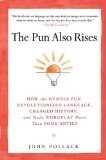How the Humble Pun Revolutionized Language, Changed History, and Made Wordplay More Than Some Antics
by John Pollack
Gotham Books, 2011. 212 pages.
I can’t help but love a book that traces the history of puns and reports the many ways they have contributed to human history.
When I saw this book was ordered by the library last year, I knew what I had to get my Dad for Father’s Day. Sure enough, he came to visit me right before Father’s Day, when he had not yet received my gift. The first thing his eye fell on when he walked into my dining room was the stack of books in the corner with this one on top. I had to laugh. I knew it was the right gift for my Dad. Never mind that I was also looking forward to reading it!
I enjoyed the introduction the most. The author tells about how he went to the eighteenth annual world pun championships to investigate competitive punning and ended up the winning the whole thing. He continues, talking about the noble history of the humble pun:
Critics and curmudgeons often deride the pun as the lowest form of humor. Others would counter that if that’s true, it would make punning the foundation of all humor. A close study of history reveals, however, that the reflexive association between puns and humor is a relatively recent development. In ancient Babylonia and Greece, to wit, punning often had religious implications and could even lead to armed conflict.
In any case, punsters throughout history have served as some of the most adventurous scouts on the frontiers of language. . .
It’s simple, and not so simple. As children gleefully learn to spot and evaluate secondary meanings in common words and phrases, they’re really learning how to think critically. To get the joke, they have to overlook the obvious to explore other possible interpretations of what they have just heard, and fast. . . .
So what’s the alchemy at work here? How do the best puns manage to layer so much meaning, humor, even irony into just a few words? And why in the world is punning so intrinsic to human expression that it sparks such mischievous delight in languages as diverse as Tzotzil, Yoruba, French, Pitjantjatjara and Japanese? . . .
But what, exactly, is the link between punning and civilization? What cultural, emotional or functional need does it fulfill across so many centuries and continents? What makes wordplay in general, and punning specifically, such an enduring part of language? Could it be biological and, if so, what evolutionary purpose might it serve? And why should laughter itself even matter in the survival of the fittest?
Ultimately, while puns may seem simple, the art and implications of punning are not. So why, exactly, do bears go barefoot, and what does that reveal about the human condition?
I hope you enjoy this hunt for answers.
I think this is enough for me to tell you. That was enough for me to know I had to read this book. If you feel vaguely repelled by this description, don’t bother. We don’t need you to know the truth. As John Pollack says at the end of his book:
Inevitably, some people will never like punning because it fogs up the lens of clarity through which they view the world and impose order, or at least the illusion of order. But if puns seem, at times, to confuse, they actually enlighten us through both laughter and insight. They keep us from taking ourselves too seriously, and sharpen our capacity for creative thinking. Ultimately, puns keep our minds alert, engaged and nimble in this quickening world, revealing new connections and fresh interpretations. And that’s why, even as we hurtle into a future of uncertain opportunities, puns will always be more than some antics.
Find this review on Sonderbooks at: www.sonderbooks.com/Nonfiction/pun_also_rises.html
Disclosure: I am an Amazon Affiliate, and will earn a small percentage if you order a book on Amazon after clicking through from my site.
Source: This review is based on a library book from the Fairfax County Public Library.
Disclaimer: I am a professional librarian, but I write the posts for my website and blogs entirely on my own time. The views expressed are solely my own, and in no way represent the official views of my employer or of any committee or group of which I am part.
